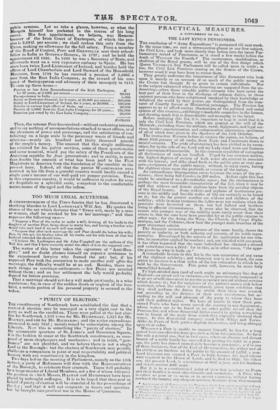TOO MUCH LEGAL ACUTENESS.
A CORRESPONDENT of the Times fancies that he has discovered a shocking blunder,in Lord LANGDALE'S Will Act. He quotes the clause of the act which declares that "Every will, made by a man or woman, shall he revoked by his or her marriage ;" and then supposes the following case- " Suppose a Peer of the realm to make a will, devising all his lands to the daughter of another Peer, being about to marry her, and having a brother who would take such land if no such will was made.
"Suppose that after such marriage the said Peer should die before his wife; then, by this act, his brother takes all his lauds, and his wife loses all that her husband intended she should have.
"I believe Dr. Lushington and Sir John Cimpbell are the authors of this Will Act, and that I have correctly stated the effect of it in the supposed ease."
The writer of this letter takes the signature of "Anti-Bun. gler; " and no doubt plumes himself on superior acuteness to the experienced lawyers who framed the act: but, if his supposed Peer took the precaution to make another will after his marriage, the difficulty would be at an end. Besides, there are such things as marriage-settlements — few Peers are married without them ; and on ber settlement the lady would probably depend for future provision. That a marriage should revoke a will made previously, is a wise regulation; for, in ease of the sudden death or neglect of the hus- band, a certain portion of his personal property is secured to the widow.


























 Previous page
Previous page